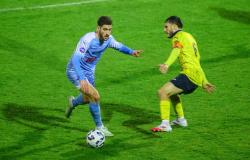What if we think we are the victim of a myocardial infarction?
“If you feel this pain, the only thing to do is to lie down and immediately call for help,” said Professor Henry. Any effort or displacement can cause heart rate disorders and increase the risk. If help are not available (abroad, for example), it is better to lie down in a car and get transported quickly to the nearest hospital. “Never take the wheel yourself, because a rhythm disorder could cause an accident,” warns the doctor.
The writing advises you
Why is excessive effort very risky?
“The extent of damage and consequences is generally not influenced by the efforts that the patient could make at the time of the infarction,” explains Patrick Henry. On the other hand, efforts can promote the appearance of heart rate disorders, from the start of the infarction. They are deadly if an electric shock is not administered in an emergency ”. This is one of the main reasons to be defibrillators present in cities.
What can we do and what gestures to adopt while waiting for help?
“In this stressful situation, lie down and try to breathe gently and deeply,” advises Professor Henry. Do not walk. The elongated position is preferable because it reduces the work of the heart. In addition, in the event of a brutal acceleration of heart rate, this avoids falls and injuries. ”
What will the emergency services do on the way to the hospital?
Rescue will start by confirming the diagnosis with an electrocardiogram. They will ensure your safety by constantly monitoring the pace of your heart and by assessing the effects of infarction on your body. “In the event of a complication, such as an acceleration of the heart rate, they will be able to administer a medication to slow it down or make an electric shock (which you will not feel)”, specifies the doctor.
What intervention in the hospital?
Rescuers will lead you to a hospital equipped with the coronarography room, where cardiologists will immediately proceed to the unlocking of the blocked artery. “The target treatments will aim to dissolve or facilitate the dissolution of the clot, in order to reopen the artery,” explains Patrick Henry. When the heart is very affected, drugs can be administered to help the heart work.
A golden rule: the faster the intervention, the lower the consequences. “In practice, it is rare that there are serious sequelae if the obstructed artery is reopened within and a half hour which follows the infarction,” sums up the doctor. Generally, the consequences are maximum after six hours. Beyond this period, the very question of the reopening of the artery arises. »»








